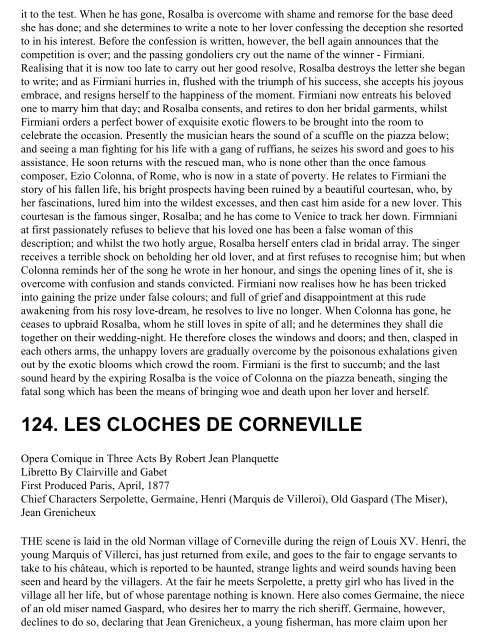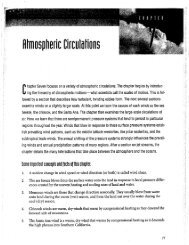Opera Plots I - MDC Faculty Home Pages
Opera Plots I - MDC Faculty Home Pages
Opera Plots I - MDC Faculty Home Pages
Create successful ePaper yourself
Turn your PDF publications into a flip-book with our unique Google optimized e-Paper software.
it to the test. When he has gone, Rosalba is overcome with shame and remorse for the base deed<br />
she has done; and she determines to write a note to her lover confessing the deception she resorted<br />
to in his interest. Before the confession is written, however, the bell again announces that the<br />
competition is over; and the passing gondoliers cry out the name of the winner - Firmiani.<br />
Realising that it is now too late to carry out her good resolve, Rosalba destroys the letter she began<br />
to write; and as Firmiani hurries in, flushed with the triumph of his success, she accepts his joyous<br />
embrace, and resigns herself to the happiness of the moment. Firmiani now entreats his beloved<br />
one to marry him that day; and Rosalba consents, and retires to don her bridal garments, whilst<br />
Firmiani orders a perfect bower of exquisite exotic flowers to be brought into the room to<br />
celebrate the occasion. Presently the musician hears the sound of a scuffle on the piazza below;<br />
and seeing a man fighting for his life with a gang of ruffians, he seizes his sword and goes to his<br />
assistance. He soon returns with the rescued man, who is none other than the once famous<br />
composer, Ezio Colonna, of Rome, who is now in a state of poverty. He relates to Firmiani the<br />
story of his fallen life, his bright prospects having been ruined by a beautiful courtesan, who, by<br />
her fascinations, lured him into the wildest excesses, and then cast him aside for a new lover. This<br />
courtesan is the famous singer, Rosalba; and he has come to Venice to track her down. Firmniani<br />
at first passionately refuses to believe that his loved one has been a false woman of this<br />
description; and whilst the two hotly argue, Rosalba herself enters clad in bridal array. The singer<br />
receives a terrible shock on beholding her old lover, and at first refuses to recognise him; but when<br />
Colonna reminds her of the song he wrote in her honour, and sings the opening lines of it, she is<br />
overcome with confusion and stands convicted. Firmiani now realises how he has been tricked<br />
into gaining the prize under false colours; and full of grief and disappointment at this rude<br />
awakening from his rosy love-dream, he resolves to live no longer. When Colonna has gone, he<br />
ceases to upbraid Rosalba, whom he still loves in spite of all; and he determines they shall die<br />
together on their wedding-night. He therefore closes the windows and doors; and then, clasped in<br />
each others arms, the unhappy lovers are gradually overcome by the poisonous exhalations given<br />
out by the exotic blooms which crowd the room. Firmiani is the first to succumb; and the last<br />
sound heard by the expiring Rosalba is the voice of Colonna on the piazza beneath, singing the<br />
fatal song which has been the means of bringing woe and death upon her lover and herself.<br />
124. LES CLOCHES DE CORNEVILLE<br />
<strong>Opera</strong> Comique in Three Acts By Robert Jean Planquette<br />
Libretto By Clairville and Gabet<br />
First Produced Paris, April, 1877<br />
Chief Characters Serpolette, Germaine, Henri (Marquis de Villeroi), Old Gaspard (The Miser),<br />
Jean Grenicheux<br />
THE scene is laid in the old Norman village of Corneville during the reign of Louis XV. Henri, the<br />
young Marquis of Villerci, has just returned from exile, and goes to the fair to engage servants to<br />
take to his château, which is reported to be haunted, strange lights and weird sounds having been<br />
seen and heard by the villagers. At the fair he meets Serpolette, a pretty girl who has lived in the<br />
village all her life, but of whose parentage nothing is known. Here also comes Germaine, the niece<br />
of an old miser named Gaspard, who desires her to marry the rich sheriff. Germaine, however,<br />
declines to do so, declaring that Jean Grenicheux, a young fisherman, has more claim upon her













